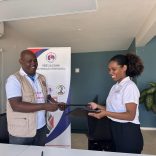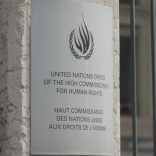Mozambique: MozYouth and Salesian Network join forces to promote youth employability
Carlos Cardoso: “Brilliant, very intelligent and cultured”, maybe “politically naive ”- interview with Fernando Lima

Photo by Sérgio Santimano
Next Sunday, November 22, Mozambique marks the passing of the 20th anniversary of the murder of journalist Carlos Cardoso, who is considered an icon of investigative journalism in the country. To remember this ’emblematic’ man, ‘Carta’ talked to Fernando Lima, who worked with Cardoso at the Mozambican Information Agency (AIM) and one of the members of the “Clube dos 13” (including Carlos Cardoso), who founded the first private media company in the country, Mediacoop, SA, a cooperative of journalists, created in 1992.
Fernando Lima, who was chief editor at AIM during Carlos Cardoso’s time, describes him as “a very intelligent and highly cultured individual”, although “politically naive”. Among Carlos Cardoso’s qualities, he highlights the beauty of his writing, the calibre of his sources of information and his respect for them, as well as his fantastic work capacity.
With regard to “naivety”, the current chairman of Mediacoop points out that Cardoso blindly believed that, with the introduction of the Press Law, public media bodies had become independent, to the point of creating a Radio Mozambique programme which did not last six months.
Carta: You worked with Carlos Cardoso both at AIM and at Mediacoop. Can you share with us what you still remember about the man?
To start with, I think there are two people that I miss very much in my day-to-day work: Carlos Cardoso and Kok Nam. Carlos Cardoso for the depth of the debates we had and Kok Nam for the emotional side and for the life experience that I had. Kok Nam was a very important element to trust and to share. So, this shows the relationship I had with these two people and the feeling of loss that I have for Cardoso’s death. Even though he left mediaFax for Metical, we always had a good relationship.
I had known Cardoso since independence, and before 1980, we worked in different media [Lima for Notícias and Carlos Cardoso at Revista Tempo], but we frequented the same circle of friends.
I arrived at AIM in 1976 [from Notícias, where he worked for only six months, from March to September 1976], and Carlos Cardoso arrived in 1980, after the usual political purges in the media. Cardoso, like me, was one of the people affected by these political purges in the media sector.
Carlos Cardoso was a particularly brilliant individual. That is, he was very intelligent and very cultured. He had both these sides, you see. Because one may be intelligent and not be cultured.
This made him an excellent professional. In addition, he had good writing. In fact, he had a lot of talent, and that’s why I say he was brilliant, because everything he did was very good (he was good at sports, playing the guitar, dancing, etc.).
But, as they say “there is no beauty without imperfection”. From my point of view, he was politically naive. That is, when a person is in political struggles, one must have a sense of opportunity and one must have a sense of tactics. The last thing Cardoso had was that sense of opportunity and that tactical sense.
For this reason, Carlos Cardoso, a man who was expelled from South Africa for having hoisted the Frelimo flag on the campus of Witwatersrand University and, during the heated debates in the media sector led by Mr. Jorge Rebelo, he was accused of being an Apartheid sympathiser, which is blasphemy. But this means that when politics is authoritarian, it is possible to carry out these types of attacks. In retrospect, I would say that Cardoso would constantly set himself up. In other words, a person who always gives the chest to the bullets can easily be shot down.
I will give an example of one of Cardoso’s great naiveties and which was perhaps one of his great schisms.
He believed that being Director of AIM took up a lot of time and he wanted to be a full-time journalist He didn’t want to sign papers, he didn’t want to go to meetings. He just wanted to be a journalist.
And I said, “Be careful! The day you stop being director you lose the power you have, so you will not be able to write what you write because you are the Director of AIM. Even if they don’t agree with you, they have to wrinkle their noses and swallow it, because they were the ones who appointed you.”
In the end, so much did he insist on stopping being director of AIM that they indulged him and, FROM the day he became an ordinary journalist, anything daring he wrote was cut and never came out because the media system which was in place meant that AIM did not exist in a vacuum: AIM’s texts went to Rádio, to Notícias and eventually to Tempo magazine.
This was a big disappointment for him and he resigned. He left in the middle of a great depression, and he abandoned journalism and started to make very strange paintings, in which he mixed paints and put them in the oven. Then he went to Norway for almost a year.
One other schism shows his naiveté. He thought that Radio Mozambique (RM) was an independent news agency, as described in the Press Law! Not true! They never put it into practice, and still do not put to this day. But Cardoso thought so, so he went to buy airtime in RM, where he made a programme which did not last six months. Finished! Finished because his program was politicised, unlike the others, which were entertainment.
The third question, which I think was a great mistake, was that Cardoso believed that the institutions worked with independence and integrity. So, at one point there was an international movement to import a printing press for the entire independent media [in Mozambique] to print on.
Cardoso, who was an unavoidable personality, said that those urging the importing of a press were lunatics, and that the country already had one (from Cegraf) and that the important thing was to get it repaired. As we know, this printer has always been hostile towards the independent press, such as the Gráfica do Jornal Notícias of 30 years ago. So, his stance reinforced the Government’s position.
You speak of Cardoso’s naive side, but I would also like to know about his brilliant side.
We could all be depressed, saying that “This is over, it is not worth fighting for, just do what the regime wants”, but Cardoso had this ability to pull rabbits out of his hat, in a fantastic way.
In other words, if he arrived in this room [where the interview took place], and we were all depressed, not wanting to do anything, Cardoso would start turning things upside down. And what started as a very depressing meeting, ended up a fantastic meeting, in which we managed to see the light from where we were.
So, only a brilliant person could turn things around, and Cardoso could go to a meeting of senior leaders in the country, including presidents, and his eloquence in speaking was able to turn the meeting around and get everyone applauding him.
For example, there were meetings at Escola Secundária Josina Machel, in which Cardoso made an attack against corruption and which led Armando Guebuza to make a dark counterattack.
In fact, we thought that, after Guebuza’s intervention, Cardoso could only leave in a prison van to a re-education camp. Cardoso responded to Guebuza and the whole room (of Frelimo militants) applauded Cardoso.
So he was brilliant, not only in the quality of his arguments, but also for the eloquence of his speech, which managed to turn things around. But, he also had a fantastic ability to work. He was able to arrive in the morning at mediaFax and leave at midnight and, in the middle of this, went to press conferences, lunches, dinners, everywhere …
Fernando Lima and Carlos Cardoso were part of the group of journalists who decided to create the first private media company in Mozambique. Can you tell us what Carlos Cardoso’s role in this process was?
“The initial role was zero. That is, Cardoso was in exile in Norway. So, the hard core of what ended up as Mediacoop first established contact with Cardoso for him to join Mediacoop and then it was a natural process. He was invited to join Mediacoop and he joined without reservation. You see, Cardoso had this great frustration that we were always planning a newspaper, but the newspaper never came out. So, we invited him to edit mediaFax and he embraced this project and I think he revolutionised the Mozambican media with this project, from an editorial point of view. First, he showed that news about Mozambique made by Mozambicans were accepted in the local and foreign market and thereby gave great credibility to Mediacoop and to Mozambican journalism.
Legacy…
One of the things which was the basis of his journalism, and which I benefited from, was the quality of his sources and the respect that he had for them. To this day, the last places he went to where he was and with whom is still not known. Because he did not speak of these things, even to his family. Even his driver did not know who he was going to talk to, because he asked the driver to drop him off at on place and then walked to the meeting.
So he was very respectful of his sources and, in this case, I am very grateful to Cardoso, because I think he benefited me, as did his legacy, because I feel that there are many people who trust me because he was my colleague and because I think I minimally respect my sources.
Where were you and how did you receive information about the murder of Carlos Cardoso?
I was studying in Portugal, and I received a call from Mr. António Almeida Matos, who was a good friend of Cardoso and who is also my good friend. He didn’t tell me that Cardoso died, but I think he was preparing me for what was coming. He told me that there had been an attack on Carlos Cardoso and that the news was very bad. We didn’t even exchange any more phone calls, because minutes later the news spread.
I was part of a Committee of Inquiry of the Committee for the Protection of Journalists (CPJ) and I was very involved in the follow-up to Cardoso’s death. Then we [Mediacoop] were targeted by the offer of chickens by Ms. Marcelina Chissano… So we followed Cardoso’s death with a lot of activism and pain, regardless of whether he left Mediacoop. In fact, our [ Savana/mediaFax] newsroom is called the Carlos Cardoso Room. It is a tribute we pay because we think he is a very important person in Mozambican journalism and a person who was and who remains inconvenient.
Twenty years after his death, do you feel there is continuity in journalism done by him or was he an exception?
I think the elegance of his writing is unique. I don’t see many people with the quality with which he wrote. I don’t mean his journalistic genre, because I have a lot of reservations. But in recent years, journalists with great courage have appeared and they are writing important things, with research involved. What I notice is that, today, investigative journalism is politically disengaged. In other words, Cardoso, even in the time of one party system, was a politically engaged individual. He was loyal to – not in favour of – this country’s political leadership.
In your opinion, was justice achieved regarding his death?
I think there was partial justice. To this day, although we have suspicions, we do not know who was responsible. In my opinion, I think that certain people who are indicated as masterminds and who were convicted were, for me, instruments of the execution of the murder. There are masterminds who, still today, are in the shadows. So I say that partial justice has been done. But partial justice was done because the international community became aggressively involved in finding the perpetrators of Cardoso’s murder. President Chissano was asked about the death of Carlos Cardoso in several international capitals, and that alone made the investigation and the trial possible.
In fact, it is important to single out the role of the Nordic countries and Great Britain in this pressure on Mozambique. This group of countries put a lot of pressure on the trial. And that trial had a great impact in this country and, for me, one of the great examples is that ‘chapas’ [minibuses] that appeared with the name of “Meretíssimo” [Your Honour] on them. This reflects the popular feeling that existed, above all because the trial was broadcast as if it were a ‘telenovela’ television soap opera.
In fact, one of the things which irked the Frelimo elite was seeing the’ chapas’ driving around with Cardoso’s photo on them, as well as seeing ‘simple’ people stopping at the place where he was murdered, to pay tribute. He was a very popular individual. I don’t think we knew, in his lifetime, the dimension of the popular image he had. We think he was important among the elites, but we never imagined, in my view, the full impact of his image. I passed houses in the suburbs which had Carlos Cardoso’s photograph pasted up, as if he were a relative. This indicates that, in life, he had a great impact on simple people, at least in this city.”
By Abílio Maolela













Leave a Reply
Be the First to Comment!
You must be logged in to post a comment.
You must be logged in to post a comment.